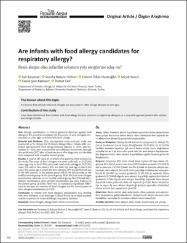Are infants with food allergy candidates for respiratory allergy?

View/
Access
info:eu-repo/semantics/openAccessDate
2020Author
Karaman, SaitErdem, Semiha Bahçeci
Nacaroğlu, Hikmet Tekin
Yazıcı, Selçuk
Karkıner, Canan Şule
Can, Demet
Metadata
Show full item recordAbstract
Aim: Allergic sensitization in infancy generally develops against food allergens. We aimed to investigate the frequency of aero-allergens sensitization at older ages in infants with food allergy.
Material and Methods: This retrospective cross-sectional study was conducted in Dr. Behcet Uz Children's Allergy Clinic. Infants with confirmed IgE-mediated food allergy between January 1st, 2004, and December 31st, 2016, were evaluated for aero-allergen sensitivities through skin prick tests (SPT) after at least two years after diagnosis, and the data were compared with a healthy control group.
Results: A total of 187 cases, 87 of which were patients, were included in the study. The cause of food allergies was cow's milk only in 24 (27.6%) cases, egg only in 26 (29.9%) cases, both cow's milk and egg in 33 (37.9%) cases, fish only in two cases (2.3%), and both fish and egg in two (2.3%) cases. The mean age at which the aero-allergen SPT was performed was 65 (46-180) months in the patient group and 72 (48-132) months in the healthy control group. In the patient group, 39 (44.8%) had aero-allergen sensitization, whereas, in the healthy control group, five (5%) had aero-allergen sensitization. Aero-allergen sensitization was more frequent in the patient group (p<0.05). There was no statistically significant difference in the type and number of food allergies and the development of aero-allergen sensitization (p>0.05).
Conclusion: In infants with food allergies, sensitization may develop with aero-allergens at an early age. Clinical follow-up of these patients may be important in terms of allergic respiratory diseases. Amaç: İnfant dönemde alerjik duyarlanma genellikle besin alerjenlerine
karşı gelişir. Amacımız besin alerjisi olan infantlarda ileri yaşlarda aero-allerjenlere duyarlılık gelişimini araştırmaktır.
Gereç ve Yöntemler: Geriye dönük kesitsel bu çalışmada Dr. Behçet Uz
Çocuk Hastanesi Çocuk Alerji Kliniği’mizde 01.01.2004 ile 31.12.2016
tarihleri arasında başvuran IgE aracılı besin alerjisi tanısı doğrulanan
infantlar en az 2 yıl sonra deri prick testi ile aero-alerjen duyarlanmaları değerlendirildi. Aero-alerjen duyarlılıkları sağlıklı kontrol grubu ile
karşılaştırıldı.
Bulgular: Çalışmaya 87’si hasta olmak üzere toplam 187 olgu alındı. Olguların 24’ü (%27,6) sadece süt, 26’sı (%29,9) sadece yumurta, 33’ü (%37,9)
süt ve yumurta, 2’si (%2,3) balık, 2’si (%2,3) balık ve yumurta alerjisi saptanmıştı. Aero-alerjen deri prick testin yapıldığı ortalama yaş hasta grubunda 65 (46–180) ay, kontrol grubunda 72 (48–132) ay saptandı. Hasta
grubunda 39 (%44,8) olguda aero-alerjen duyarlılığı saptanırken kontrol
grubunda 5 (%5) olguda aero-alerjen duyarlılığı saptandı. Aero-alerjen
duyarlılık hasta grubunda daha sık saptandı (p<0,05). Besin alerjisinin
tipi ve sayısı ile aero-alerjen duyarlılığı gelişimi açısından istatistiksel
olarak anlamlı fark saptanmadı (p>0,05).
Çıkarımlar: Besin alerjisi olan infantlarda erken yaşlarda aero-alerjenlerle duyarlanma gelişebilmektedir. Gelişebilecek alerjik solunum yolu
hastalıkları açısından bu hastaların klinik izlemi önemlidir.

















